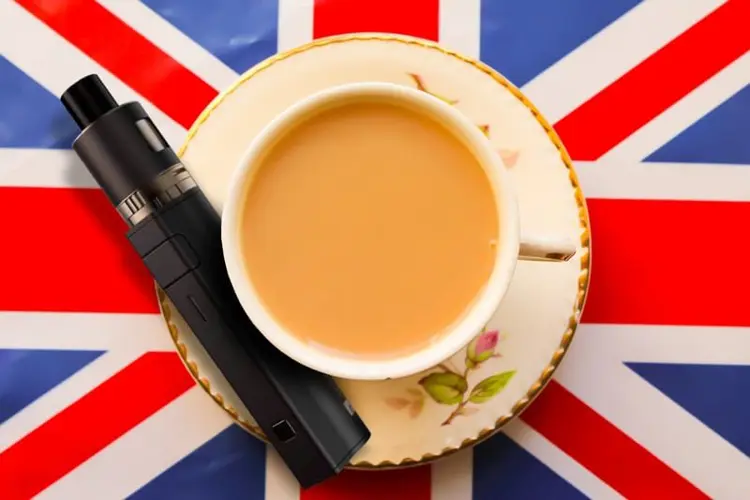A committee of the U.K. Parliament has issued a report endorsing the promotion of e-cigarettes to smokers, and calling for review of some vaping products restrictions. The report also rejects the idea that using e-juice and vape pens acts as a gateway to smoking among British youth.
The committee concludes that U.K. lawmakers and regulators should not treat vapor products the same as combustible cigarettes. A vape tank is not the same as a pipe, nor is nicotine salt e-liquid the same as a bag of RYO Bugler.
The report, from the House of Commons Science and Technology Committee, follows months of testimony from public health and scientific experts, and representatives from tobacco control organizations, and the vaping industry and consumer community. The committee is chaired by MP Norman Lamb of North Norfolk.
The specific recommendations from the committee are:
- Encourage a wider debate about vaping in public places
- Continue to annually review the evidence on e-cigarettes, and extend the review to heat-not-burn products
- Institute a long-term research program overseen by Public Health England and the Committee on Toxicity of Chemicals in Food, Consumer Products and the Environment
- Review the 20 mg/mL limit on e-liquid nicotine strength
- Review the 2 mL limit on tank size
- Review the prohibition on making health claims for the relative health benefits of vaping versus smoking
- Regulations, advertising rules, and taxes should “reflect the evidence of the relative harms of the various e-cigarettes, heat-not-burn and tobacco products available”
- The National Health Service (NHS) should allow vaping in mental health facilities as a default policy
- The government should review the evidence supporting the current ban on snus
Some of the recommendations can’t be acted upon until the U.K. leaves the European Union, since the rules are part of the EU’s Tobacco Products Directive (TPD). The nicotine strength and tank size limits, and the advertising restrictions are all mandated by the TPD. The snus ban is also part of EU tobacco regulations. (Snus is Swedish smokeless tobacco that has been shown to carry no discernible risk.)
Last year’s official English tobacco control plan also urged reconsideration of some of the TPD-mandated restrictions on vaping products. But that plan only includes England, not the rest of the U.K. (which also includes Scotland, Wales, and Northern Ireland).
The report urges a more efficient process for licensing medical e-cigarettes, which some in the vaping community have viewed skeptically, seeing pharmaceutical e-cigs as a threat to the consumer vaping market. Of course, they may also just be another option for smokers — and one that doctors might embrace more readily.
The committee also recognizes that mentally ill people smoke at much higher rates than the general public, and should benefit from the lower risk of vaping to themselves and bystanders. Many NHS hospitals currently ban smoking and vaping on their grounds.
“The percentage of people smoking among those with mental health conditions remains stubbornly high, while it is declining in the general population,” said committee chair Norman Lamb. “People with mental health conditions are almost 2.5 times more likely to smoke compared to the general population. It is therefore extraordinary that one-third of mental health trusts ban the use of e-cigarettes completely, while three-quarters of NHS trusts are mistakenly concerned about ‘second-hand’ e-cigarette vapour.
“This is unacceptable,” Lamb noted. “Those with mental ill health are being badly let down and NHS England appear to have failed to give this any priority. NHS England’s default policy should be that e-cigarettes should be permitted in mental health units.”
The nicotine strength limit, tank size requirement, and advertising restrictions are all mandated by the TPD.
The New Nicotine Alliance (NNA) welcomed the report. Britain’s most prominent consumer advocacy organization issued a statement praising the committee report for its “evidence-based policy proposals which would positively transform the way vaping is viewed by businesses, institutions and the public alike.”
“E-cigarettes are a proven safer alternative to smoking and the UK boasts 1.5 million former smokers who have converted from combustible tobacco to exclusively vaping instead,” said NNA chair Sarah Jakes. “The Science and Technology Committee has wisely recognised that misconceptions about e-cigarettes are threatening further progress in encouraging their use by smokers who choose to quit.”
“We welcome the Committee’s call for a root and branch review of how risk-reduced products are treated by businesses, institutions and government itself. The report is a beacon of enlightenment in an area of public health which is often burdened by dogma and outdated thinking towards the use of nicotine.
“There is a lot of confusion about e-cigarettes amongst the public, health institutions and businesses”, Jakes noted. “This report is therefore timely and could have hugely positive implications for public health if its recommendations are implemented in full. Sir Norman’s committee has done an excellent job of peering through the mist of misunderstanding surrounding e-cigarettes and its policy proposals can go a long way to dispel the - often deliberately fabricated - misconceptions that are deterring many thousands of smokers from switching.
"We would urge the government to read the Committee’s findings carefully and act on them without delay.”
The Freemax REXA PRO and REXA SMART are highly advanced pod vapes, offering seemingly endless features, beautiful touchscreens, and new DUOMAX pods.
The OXVA XLIM Pro 2 DNA is powered by a custom-made Evolv DNA chipset, offering a Replay function and dry hit protection. Read our review to find out more.
The SKE Bar is a 2 mL replaceable pod vape with a 500 mAh battery, a 1.2-ohm mesh coil, and 35 flavors to choose from in 2% nicotine.
Because of declining cigarette sales, state governments in the U.S. and countries around the world are looking to vapor products as a new source of tax revenue.
The legal age to buy e-cigarettes and other vaping products varies around the world. The United States recently changed the legal minimum sales age to 21.
A list of vaping product flavor bans and online sales bans in the United States, and sales and possession bans in other countries.


















